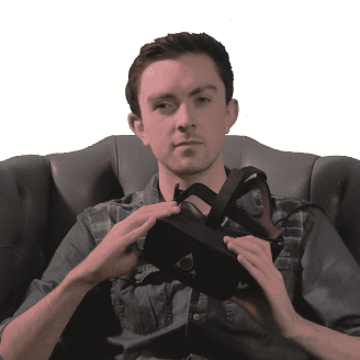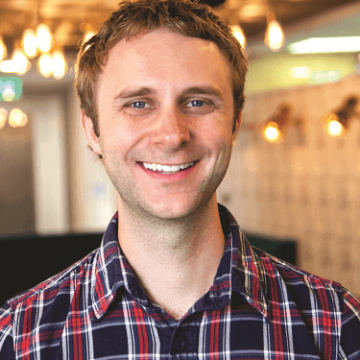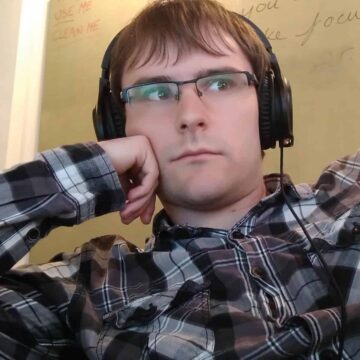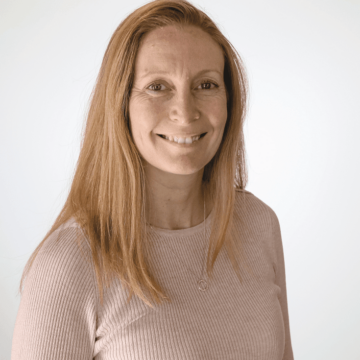The development industry is now more diverse than ever, with gaming, mobile and apps all being important areas. You could be working in roles that range from understanding the technical aspects of cyber security, or business process analysis, to building the websites and software that every business now relies on.
Tim Davidson – Hollis Consulting
What do you do?
I am a software developer that focuses primarily on iOS applications built using the Swift programming language. From the initial planning and design stages, to developing the source code/user interfaces and then testing and submitting the applications. There are also the non- technical aspects such as meeting with clients or providing support to users. Some time is also spent learning/researching new areas of code and becoming familiar with new programmes or tools.
What training have you undergone?
After gaining my A-levels, I joined Hollis Consulting, where I began on-the-job training and working on some internal projects before being introduced to real client apps. Learning new things is a big part of the job, I spend a lot of time self-teaching.
Skills you need for the job?
An ability to learn quickly and explore new ideas is very important in this type of work. Some times it’s easy to feel overwhelmed by the amount of technical understanding required, so being persistent and having patience is a must. Building apps under pressure and within strict client time frames requires self motivation and the ability to know where to usefully focus your time.

Tim McGuinness – Virtual Reality Jersey
What do you do?
I specialise in all things Virtual & Augmented Reality, from entertainment to healthcare, from architecture to art. A software developer one day, an entertainer the next, every day brings something a little different in my line of work.
What training have you undergone?
I completed A Level and A+ IT qualifications a year early at school after which I went on to work in and then manage the IT support for one of the largest trust companies on the island. This provided me with a base skillset to work from. From there I went on to develop skills in relevant areas such as game development, marketing and business development.
What do you do on an average day?
Due to the massive range of clients and industries that can benefit from VR/AR technology there is so much variation that very rarely are any 2 days the same! One day I’ll be organising a VR experience for a party, next I’ll be virtually building someone’s dream home and the next I’ll be researching neuro-interfacing/VR technologies understanding how it can help people with conditions like dementia.
Skills you need for the job?
Passion. Short and sweet, it’s the reason I am here today and it’s the same reason anyone gets anywhere with anything. That and some good problem solving skills!
Advice for job seekers in the same field:
Keep developing your skill set and keep it varied. In today’s world and especially in the VR/AR industry the type of problems we face change on a daily basis. It’s all about developing the tools that you have at your disposal and making sure that their value is recognised by yourself and others.

Chris Reed – Specsavers
What do you do?
I develop and maintain pages, sections and CMSs to support our 10 websites. This involves coding bespoke marketing pages based on visuals from designers, prototyping new functionality, and leading the development of a set of systems that allow non-coders to assemble content pages for our sites.
What do you do on an average day?
I’m typically writing and testing code, investigating and fixing bugs, and emailing our project managers about job statuses. We also play mini golf and bean bag toss in the office – these games are a great way to loosen up and re-energise!
Skills you need for the job?
For this role, you’ll need to have a good knowledge of HTML, CSS and JavaScript, ideally some experience with a server-side language like PHP, and familiarity with the command line and Git. An awareness of the current trends and technologies, a desire to learn, and a passion for problem solving are essential.
What training have you undergone?
I went to university and completed an Interactive Media degree. From there I landed a graphic design job at a local agency where I was able to branch out into web development and learn more with every website I built. Since then I’ve moved to bigger teams where I’ve learned from co-workers and by taking courses on www.teamtreehouse.com.
Advice for job seekers?
A strong portfolio is what can set you apart from the next candidate, so be sure to have examples of projects or websites that you’ve put your best efforts into – they don’t have to be finished.
“Save snippets of code and keep them organised by programming language. These can be very handy to refer back to in the future.”

Alexander Troy – Alemba
What do you do?
My role involves building and sometimes designing programs which run on a variety of computing devices. I personally work on IT service management software for Alemba.
What do you do on an average day?
I get into work, get a cup of coffee, and pick up wherever I left off either debugging or fixing software. After I’m done I’ll maintain documentation and source control, to ensure the code can be included in a release. Skills you need for the job? You should be able to work with the Microsoft stack, web technologies and source control. Being handy with devops/IT and industry relevant softer skills would also an advantage.
What training have you undergone?
A degree in Computer Science and Philosophy, experience (both in work and at home) with a variety of programming languages,
and occasionally a bit of devops/IT whenever said becomes unavoidable.
Advice for job seekers?
A calm patient demeanour and dedication to the work is irreplaceable. When working on software, you can often do more harm than good when treating the experience with reckless abandon. Prove to potential employers that you’re a safe set of hands by showing them a wealth of stable, documented projects you have participated in.
Career prospects?
Software is a highly in demand career which can be applied to nearly any industry. If there is some interest you have, there is likely someone in the world working on software for it.
“Stay calm and caffeinated at all times.”

Martin Blampied – C5 Alliance
What do you do?
As a consultant in Jersey’s technology industry you get to work with a huge variety of technologies and clients, ranging from international banks to cutting edge start-ups. Over the last few years in addition to creating websites and enterprise applications, we’ve been able to implement IoT solutions with the Bus Tracker, use machine learning to implement image recognition for GardenTags and explore AR/VR solutions with the Microsoft HoloLens.
What do you do on an average day?
Identifying and solving problems. The problems will differ depending on the stage of the project. It may be coding a new website or querying a database. It might be drawing a system architecture so it can scale in a clean and reliable way, or it may be asking the right questions to get a client to express what problem they need to be solved.
Skills you need for the job?
A Junior Consultant needs an interest in tech and probably a basic understanding of at least one mainstream programming language (C#, Python, Java, PHP, JavaScript, C++, ObjC, Swift).
What training have you undergone?
I did A-level Computer Science at Victoria College, then a degreein Computer Science at Lancaster University. While university is one approach and one I was fortunate enough to have, I probably only use 20% of what I learnt there in the real world. Tech is the fastest moving industry you need to be prepared to be constantly learning. Every new job I’ve started (4) I’ve had to learn a new language. My first day as an iOS developer I had to Google “How to turn on a Mac Mini“.
Advice for job seekers?
Jersey’s a small island, it’s pretty easy to make yourself known. Connect with the tech community in the techtribes slack channel, go to tech meetups, have a GitHub page, write a blog, share interesting tech related tweets, make a website/app on something you’re interested in.

Matthew Falle – Corefocus
What do you do?
One of my main responsibilities is to manage our internal support system. I also assist on various client projects involving Microsoft Dynamics CRM, GP & RMS, the work may involve analysis, coding or UI work.
What do you do on an average day?
I assist our clients with their support queries and development. I also work on different projects that are at various stages while keeping up to date on the tech we use.
Skills you need for the job?
Being able to think logically through problems, coding knowledge, ability to communicate with your team and clients effectively. You need to be able to put yourself in the mind of the users that will be using the software you are providing them to make sure its appropriate.
What training have you undergone?
After finishing my A-Levels at Hautlieu I went on to complete a Computer Science degree at university. From there I was able to get an internship at Corefocus in the summer of my 2nd year at university.
Advice for job seekers?
Try to gain relevant work experience to what you want to do. It looks great on your CV and gives you the chance to see what its really like in a working environment and if the job is what you thought it would be like. Career prospects? With tech constantly changing there’s always many career prospects. I will be continuing to develop my knowledge through training courses, on the job learning and self-learning.
“Don’t be afraid to go outside of your comfort zone, you might end up finding something you really enjoy.”

Peter Lamy – 4insight
What do you do?
Provide actionable insights to clients through numerous research methodologies, from user testing websites/app designs, (with the help of specialist eye-tracking) to carrying out online surveys/communities and focus groups. Each project requires a specific approach as research can take place in any sector.
What do you do on an average day?
Depending on what type of project or phase we’re in I may be meeting with clients, designing & programming questionnaires, recruiting respondents, conducting fieldwork, analysing and preparing data/insights or presenting findings.
Skills you need for the job?
Researchers come from all types of different backgrounds, from Statisticians to Psychologists, so there is no set entry requirements. Ideally you will have strong organisation & communication skills, be good at problem solving & thinking on your feet, as well as being able to be analytic and objective.
What training have you undergone?
My degree (BA Hons Marketing with Events Management) helps provide realistic recommendations from a strategy perspective, and helps in project management, but is not a prerequisite. I’m also a digital apprentice of the Trackers Programme, through their mentorship and 4insight training I have: Gained the MRS Certificate in Market and Social Research, worked towards Microsoft Specialist (MS) Windows 7 and taken part in ad-hoc off island professional training such as in running online panels and communities, moderating, analysis, NLP and storytelling.
Career prospects?
Although marketing, social research and behavioural economics are something of a developing industry in the Channel Islands, it is growing. Research and Insight Managers are becoming increasingly valuable to organisations and management boards as they provide valuable insight into what direction and innovations they can carry out.

Anna Milon – C5 Alliance
What do you do?
I’m a Senior Consultant in the Bespoke Development team, specialising in customising Microsoft Dynamics CRM for clients and using software development to implement additional functionality.
What do you do on an average day?
Every day is different when you are doing development work, which is one of the things that I enjoy about it. I tend to work on large projects for a number of months to deliver a system to a client’s requirements, so there are different tasks depending on the stage of development of the project. Currently my time is split with working with the client in their office and working with the development team in the C5 office. A typical day might be working on user acceptance testing with a client in the morning and then in the afternoon defect fixing and allocating bugs to the team.
Advice for job seekers in the same field:
To help yourself stand out in an interview, it is a good idea to have a project that you have worked on outside of work or education, to show your enthusiasm for technology and IT. What might seem small to you as a hobby, might be the differentiator that gets you the job. Even setting up your Amazon Alexa to control your lights, producing a website for a friend’s business or gaming.
